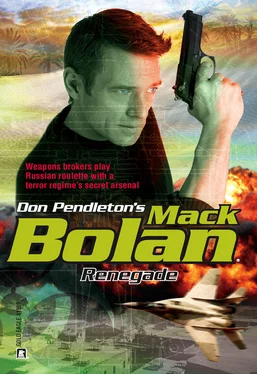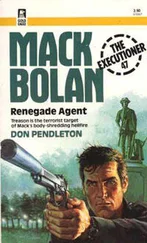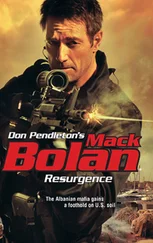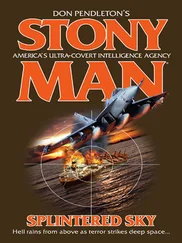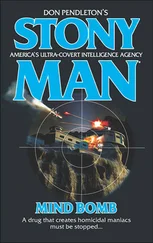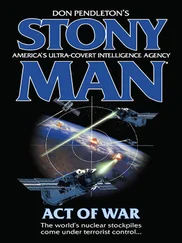Bolan studied the Iranian’s ashen face
He wasn’t completely convinced that Vanaki was up to the job, and not sure he was justified in giving him such a dangerous task, even if he was.
“I’m giving you one more chance,” the Executioner said. “You don’t have to do this. No one could ever call you a coward if you decide not to.”
When Vanaki failed to answer, Bolan left him standing by the door with the Beretta in both hands. The expression on the young man’s face told Bolan all he needed to know.
Merzad Vanaki was ready to kill in the name of both his father and American freedom. Or die, if the dice rolled that way.
Other titles available in this series:
Death’s Head
Hellground
Inferno
Ambush
Blood Strike
Killpoint
Vendetta
Stalk Line
Omega Game
Shock Tactic
Showdown
Precision Kill
Jungle Law
Dead Center
Tooth and Claw
Thermal Strike
Day of the Vulture
Flames of Wrath
High Aggression
Code of Bushido
Terror Spin
Judgment in Stone
Rage for Justice
Rebels and Hostiles
Ultimate Game
Blood Feud
Renegade Force
Retribution
Initiation
Cloud of Death
Termination Point
Hellfire Strike
Code of Conflict
Vengeance
Executive Action
Killsport
Conflagration
Storm Front
War Season
Evil Alliance
Scorched Earth
Deception
Destiny’s Hour
Power of the Lance
A Dying Evil
Deep Treachery
War Load
Sworn Enemies
Dark Truth
Breakaway
Blood and Sand
Caged
Sleepers
Strike and Retrieve
Age of War
Line of Control
Breached
Retaliation
Pressure Point
Silent Running
Stolen Arrows
Zero Option
Predator Paradise
Circle of Deception
Devil’s Bargain
False Front
Lethal Tribute
Season of Slaughter
Point of Betrayal
Ballistic Force
Renegade
Don Pendleton
Freedom all solace to man gives;
He lives at ease that freely lives.
—John Barbour,
The Bruce, c.1375
I call upon all who love freedom to stand with us now. Together we shall achieve victory.
—Dwight D. Eisenhower,
Broadcast on D-Day
It’s not enough to say that we cherish freedom. It’s important in these trying times to put our words into action if we want to stay free.
—Mack Bolan
PROLOGUE
CHAPTER ONE
CHAPTER TWO
CHAPTER THREE
CHAPTER FOUR
CHAPTER FIVE
CHAPTER SIX
CHAPTER SEVEN
CHAPTER EIGHT
CHAPTER NINE
CHAPTER TEN
CHAPTER ELEVEN
CHAPTER TWELVE
CHAPTER THIRTEEN
CHAPTER FOURTEEN
CHAPTER FIFTEEN
CHAPTER SIXTEEN
EPILOGUE
Torture was unreliable. They had tried it in the past and found that the subject didn’t necessarily tell the truth.
He said whatever he thought would stop the pain.
CIA Agent Wes Donaldson watched the man at the table through the one-way mirror. Shuaib Marfazda sat passively on the other side of the glass, seated in a straight-backed wooden chair. He hadn’t been tied to the chair, or in any other way restrained. Yet he sat as if his arms and legs had been immobilized. The only parts of his body that moved were his fingers as they tapped out some unrecognizable drumroll on the tabletop. His eyes stared straight ahead as if they’d been welded into place.
Donaldson glanced at his wristwatch, then looked through the glass at the door leading from the interrogation room into the hall. Marfazda assumed it was locked. It wasn’t. They had long ago passed the point where it was necessary to lock him in. Or use any other physical bonds, for that matter. Marfazda’s mind had become its own restraint.
No, Donaldson thought, Shuaib Marfazda, now lived in a CIA-created reality that was no more real than a child’s bedtime story. They had, in many ways, convinced him that down was up and up was down, red stop lights meant go and green meant stop. And it had all been accomplished without ever once touching the Hamas terrorist.
The door to the observation room opened suddenly. Donaldson turned to his side to see Jed Coffman’s broad, six-five frame block the light from the hallway. Coffman closed the door behind him, then moved to Donaldson’s side at the mirror. The big CIA operative frowned. “He ready?”
“Probably.” Donaldson nodded. “He’s showing most of the signs. If you wanted to compare his brain to spaghetti, I’d say it’s been boiled to a point somewhere between medium and soft.”
“I think of them more as little men made out of modeling clay,” Coffman said seriously. “We take them, smash them flat, then rebuild them the way we want them.” The tall man’s hand rose to his chin where he scratched a week’s worth of stubble. “Of course we leave enough between their ears for them to tell us everything they know.” He turned toward Donaldson. “What say we give him another few more minutes? It can’t hurt, and I could use a cup. Want some?”
Donaldson shook his head as Coffman crossed the room to the coffee machine. In the reflection of the glass, he saw the tall man lift the carafe and pour coffee into a cup. Peering through the reflection he continued to watch the terrorist on the other side of the one-way mirror. Again, Marfazda’s fingers began to drum out some unknown rhythm on the table. The finger taps had begun a few hours before, but in the past ninety minutes they’d started coming at regular five-minute intervals. Now they occurred every few seconds.
Donaldson knew every subject reacted differently to the preinterrogation process, but it had been his experience that they each showed some outward sign when they neared the breaking point.
Marfazda’s just happened to be tapping. It meant he was on the verge of that point now.
The CIA man let his mind drift back over the past few months. Shuaib Marfazda had been captured during an attempt to blow up a Beirut café frequented by Americans. A U.S. Department of State representative—a retired army colonel—had spotted several wires of his “suicide bomb” sticking out of his shirt collar as he opened the café door. Thinking quickly, the colonel had smashed the brass handle of his walking stick into the back of the man’s head.
Coffman had happened to be in the café himself at the time. Trained as an explosives expert, he had dismantled the bomb before Marfazda had regained consciousness or the Israeli authorities could arrive. The terrorist was then quickly transported to a CIA safehouse in Beirut.
Marfazda’s first few weeks had been spent in solitary confinement, in a bedroom stripped of furniture, with barred windows whose panes were painted black. The only human contact he’d had was watching an unidentified hand slide a food tray through the slot in his door twice a day. Unknown to him, a tiny microcam had been hidden in the bare lightbulb at the top of his room, which put out the same dull, monotonous half-light twenty-four hours a day. The Hamas terrorist’s every movement and facial expression—practically every thought—had been monitored ’round the clock by CIA psychiatrists and psychologists. And while Marfazda was slowly being broken down—or “smashed like clay” to use Coffman’s metaphor—CIA investigators had conducted an extensive background check.
While the café was to have been his final act, Marfazda already had plenty of blood on his hands. Bits and pieces of information had linked him to other atrocities in Israel, Afghanistan and Iraq.
Читать дальше
